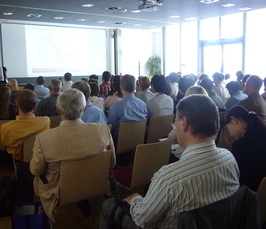MPI Kolloquiumsreihe: Prof. Dr. Athanasios C. Antoulas, Data-driven model reduction of large-scale systems
MPI Kolloquiumsreihe: Prof. Dr. Athanasios C. Antoulas, Data-driven model reduction of large-scale systems
- Datum: 01.06.2017
- Uhrzeit: 15:00 - 17:00
- Vortragende(r): Prof. Dr. Athanasios C. Antoulas
- Professor of Electrical and Computer Engineering, Rice University, Houston, Texas, USA und Fellow des Max-Planck-Instituts für Dynamik komplexer technischer Systeme Magdeburg
- Ort: Max-Planck-Institut Magdeburg
- Raum: Großer Seminarraum "Prigogine"
- Kontakt: sek-csc@mpi-magdeburg.mpg.de

Im Rahmen seines Vortrags heißen wir Max Planck
Fellow Prof. Dr. Athanasios C. Antoulas (Professor of Electrical and
Computer Engineering, RICE University Houston, Texas, USA), herzlich als Leiter unserer neuen Fachgruppe DRI Datengetriebene Systemreduktion und -identifikation willkommen.
Data-driven model reduction of large-scale systems
Dynamical systems are a principal tool in the modeling, prediction, and control of physical phenomena ranging from heat dissipation in complex microelectronic devices, to vibration suppression in large wind turbines, to storm surges before an advancing hurricane. Direct numerical simulation may be the only possibility for accurate prediction or control of such complex phenomena. However, an ever-increasing need for improved accuracy requires inclusion of more detail at the modeling stage, leading inevitably to larger-scale, more complex dynamical systems. Such systems are often linked to spatial discretization of underlying time-dependent systems of coupled partial dierential equations, and their simulation can create large demands on computational resources.
Model reduction seeks to temper these demands while still meeting the needs. In broad terms, model reduction seeks to transform large, complicated models of time dependent processes into smaller, simpler models that are nonetheless capable of representing accurately the behavior of the original process under a variety of operating conditions. The goal is an ecient, methodical strategy that yields a dynamical system evolving in a substantially lower dimension space (hence requiring far less computational resources), yet retaining response characteristics close to the original system.
Proper Orthogonal Decomposition (POD), Reduced Basis Methods (RB), Balanced Truncation and Interpolatory Methods (sometimes referred to as Rational Krylov Methods) have emerged as the most commonly used approaches. In this talk, we will focus on interpolatory methods, both for linear and nonlinear dynamical systems.
Interpolatory model reduction has matured quickly in the last decade. Its roots are in numerical analysis and linear algebra and it is related to rational interpolation. In parallel, the Loewner framework, which is a data-driven approach to interpolatory reduction, has also emerged during the same period. An important milestone has been the extension to the reduction of classes of nonlinear systems. The key is the generalization of the concept of transfer function, and the ensuing multi-variate interpolation.
In this talk we will give an overview of interpolatory model reduction with emphasis on the data-driven Loewner framework. Examples will illustrate the various aspects of the theory.